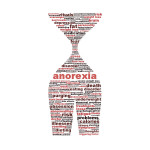I often ask myself, “where did I begin my relationship with food and why did it lead to binge eating?” While driving one day, I was listening to my 9 year old son Paul and his 10 year old friend Nate talk about a group of High School Cross Country runners that were huddled at the street corner waiting for the light to change to continue their run. This familiar group of boys ages 13-19 has always caused a lot of ruckus in our car. They always run without their shirts and thus have been lovingly termed “the shirtless guys.” Before this year, I found it funny how my modest son deemed the “shirtless guys” as a point of interest every single time. At one point, he stated “I would never run on the street without my shirt on, let alone in those short shorts.”
Binge Eating Habits Begin Early in Life
As age has matured him, the conversation progressed to the runners’ physiques. “Wow, all those boys are lean, but you can see a lot of muscle.” I, being a nutritional counselor by profession stated “yes, those boys are running anywhere from 5-15 miles a day. It’s critical that they eat a lot of food to support their activities and repair the break down of their muscles.” Nate then stated, “they get to eat as much junk food as they want and burn it off.” Seizing a great teaching moment I stated, “well, they have to make sure they are eating really healthy and nutritious food so they can keep up with the training that they are putting their bodies through.” With Paul and Nate pondering on this, Paul said “but when they aren’t training they could eat what ever they want.” Nate chimed in, “on the weekends they could eat all day long, gain 1 pound over the weekend and burn off 5 pounds during the week.” I thought to myself “AND SO THE BINGE EATING CYCLE BEGINS.”
Binge eating begins in the minds of young boys and girls trying to identify what foods are healthy and trying to negotiate, how they can still have the unhealthy foods which seem appealing. As parents try to steer children towards healthier food choices, the messages sometimes become confusing. Does the following sound familiar?
1) I can have dessert after I eat a healthy dinner.
2) I can have takeout food after I go to basketball practice because I have been running around for 2 hours.
3) The family eats healthy all week and we get pizza and soda on Friday’s to celebrate the end of the week.
4) Your boyfriend/girlfriend broke up with you. Let’s go out and get frozen yogurt.
The list is endless. As we get older and realize that we are gaining weight, we then decide to start dieting. When in diet mode, all of these hidden messages creep back into our mindset reminding us how to negotiate within our diet rules. It is commonplace to hear, “I will diet all week and then go out and have fun on the weekend.” Unfortunately, this justification ends up to binge eating all weekend long. Many athletes do this as well, with some gaining as much as 20 to 30 pounds during the “off season” making it sound more like a “binge eating season.”
When our relationship with food is seen between “being good or being bad” we often turn to binge eating as a way of negotiating or justifying our actions. “I will finish all this food today, but start a new diet tomorrow.” Instead of feeling empowered and in control of the food choices, we feel out of control, we feel our self-worth diminish, we feel that internal critic becomes more negative. You can make the choice to change this internal conflict. Stop the negotiating and stop the binge eating so you can enjoy the quality of your food. The Hungry Heart can help and has helped many people heal their relationship with food that has led to binge eating.







